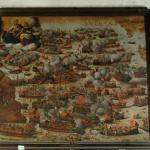 Love endures, perfect love casts out all fear. Since the Kingdom is motivated by love, we endure best when we love best. Why then do we ever center our work on anything other than love?
Love endures, perfect love casts out all fear. Since the Kingdom is motivated by love, we endure best when we love best. Why then do we ever center our work on anything other than love?
We may agree that a Christian should begin with love, but until the beloved Kingdom is fully realized, there are things that must be opposed. Love demands that we push against anything that would harm other people. We must oppose materialism, the flesh, and devils first in ourselves and then in the world order. Anger can be righteous: justice wishes to triumph over injustice and life in Christ conquers death.
This concession to continuing imperfection in ourselves can be a deadly danger. Fear motivates. Loathing energizes. Combine fear and loathing and you can sell product of all kind: books, ministries, politics, shampoo. Fear of rejection and self-loathing drummed up in commercials have sold more than one stick of deodorant. If not careful, the tool of righteous anger degenerates into mere loathing. We are unfair to “them.” They do not even recognize themselves, could not see themselves in the caricatures that hatred begins to create.
Love can be angry, but never hate. Love can be concerned for the beloved, but never focus on the fear. The beloved community is not defined by what Christendom is against, but what she is for. May God grant us courage, practical wisdom, moderation, justice, faith, hope, and charity.
A cause that begins in hate flames out. The cause that resists hate and fights for the beloved community cannot lose. This is obvious if one reflects on any righteous cause such as Greek freedom from Ottoman tyranny. The struggle lasted four hundred years, but in 1821 the final conflict came. Initial victories led to internal bickering that nearly cost the Greeks their liberty. Hatred of the oppressive Empire was not enough to sustain a nation. Practice in merely resisting without building made for a fractious group of leaders. Opposing was a habit and that trick of the heart carried over to fellow Greeks. Governments split. Heroes of past battles were distrusted. Factions split, combined with other factions, and split again so often that yesterday’s allies were murdering each other on the morrow.
Nobody wishes to ally with the fractious except the perfidious and so the Greeks found uncertain alliances. The exception were the outsiders who loved Greece, ancient, Christian, and modern: the philhellenes.* Often, however, these volunteers (like Lord Byron) came to fight without being able to find a Greece for which to fight! In this sense martyrdom was easier than governing: dying for Greece was easier than living for her freedom.
In the end, of course, love of Greece prevailed. The Greeks united (however imperfectly). To a great extent this is because Orthodox Christianity overwhelmingly united the Greek nation. They were one faith, praying the same prayers, heading to the same heaven. The spiritual struggle of Lent is toward Pascha and those that feast together find it just a bit harder to fight each other. Naturally humans can mess anything up, but the common culture, the shared history, language, and religion mattered. Greece was so rich in glories that if one just looked at Greece hard enough, then love of her would fill the heart. At any moment, any two foes could recollect this shared love and then no Empire could withstand the faithful.
The Iliad understood that a man will spend a decade before the walls of Troy for the love of Helen. What greater deeds would a man do for the love of Hellas?
So whenever we face hard times, challenges, or even injustice, we must ask what do we love? What is our shared history? What is our cause? What unites us? How can we turn Godward? There might be a place to list our enemies: the come from all over the Empire of Evil. We absolutely must list our loves: our unshakable vows.
May God grant us all a generation that builds a beloved community, fighting only when she must. And may the Lord God save beloved Hellas.
*All those who desire to know should be philhellenes!












